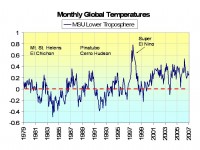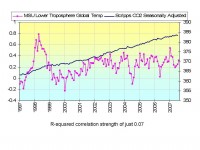US greenhouse gas emissions fell 1.5% in 2006, while the EU’s greenhouse gas emissions increased .8%.
November 2007
Yesterday, I attended an informative briefing by an official at the Department of Energy, who demonstrated the futility of any approach to climate change mitigation that does not include the developing world.
According to DOE research, even if the developed world reduced emissions 100% by 2050, developing countries would have hold their emissions constant at 2007 levels in order to reduce global emissions by enough to stem global warming.
But don’t count on the developing world to lift a finger to fight global warming. I have already made that point elsewhere, and it was underscored again this week after officials from China, India and Brazil reiterated their countries’ opposition to any limits on greenhouse gas emissions.
Senator Barbara Boxer (D-Calif.) is determined that the Environment and Public Works Committee, which she chairs, will mark up the Lieberman-Warner cap-and-trade bill on December 5, so that she will have something to crow about when she flies off to Bali the next day for the thirteenth Conference of the Parties to the UN Framework Convention on Climate Change. There has been much jockeying over the Lieberman-Warner Climate Security Act (S. 2191) in the past couple weeks.
On one side environmental pressure groups and some big companies are supporting S. 2191. Environmental Defense has begun running television ads featuring Governors Arnold Schwarzenegger (R-Calif.), Jon Huntsman, jnr. (R-Ut.), and Brian Schweitzer (D-Mont.) that urge Congress to vote for a cap-and-trade bill. This $3 million campaign is seen as providing generic support for Lieberman-Warner. On the other hand, Friends of the Earth Action, which has endorsed John Edwards for President, has run radio ads in Iowa calling on Senator Hillary Clinton (D-N.Y.) to either fix the bill or vote against it. In Friends of the Earth’s view, the problem is that the bill gives away most of the emissions allocations or credits to “big polluters” rather than requiring them to buy the allocations they need at auction.
In response to this complaint, Boxer has convinced Senators Lieberman and Warner to make some changes in their bill before next week’s mark-up. The new version changes the initial mix so that more allocations are auctioned from the beginning and speeds up the schedule for switching from free allocations to auctioned allocations.
But some long-time cheerleaders for cap-and-trade in the business community are starting to have heartburn. Duke Energy CEO Jim Rogers complained that the bill unfairly penalizes electric utilities that rely on coal-fired power plants because it would require them to buy most of the allocations they need. Electricity rates will skyrocket as a result. But he re-iterated that he still supports mandatory reductions in greenhouse gas emissions of 80% by 2050. A message from Earth to Mr. Rogers: if that’s what you support, then you’re going to have to tell your customers that this means that their electric bills are going to increase dramatically and steadily for decades.
The House and Senate Democratic leaders are reported to be close to a deal on one piece of an anti-energy package. It would include a big increase in the alternative fuel standard for gasoline and a big increase in Corporate Average Fuel Economy (CAFÉ) standards for new vehicles. Action on other parts of the House and Senate anti-energy bills, such as the tax increases on oil companies and the Renewable Portfolio Standard for electric utilities, would be put off until next year
Temperature peaked in 1998 and have shown no warming for a decade now. Many scientists have been remarking about this trend for several years but no one takes heed, preferring to believe models than actual data. Here is the satellite derived global temperature trend since 1979. Note the cooling globally near the volcanically active periods of the early 1980s and 1990s. Note also the warm spike associated with the super El Nino that seemingly marked the beginning of the end of the warm Pacific trend that began in 1978.

Note the rebound cooling as a series of 3 La Ninas in 4 years helped cool the earth in the last 1990s. Temperatures rebounded a bit in the early 2000s with a slight rebound in the Pacific warmth, three El Ninos and a volcanic aerosol-free stratosphere, but the trend since 2001 has been flat and at a level considerably below the peak of 1998. This lack of warming has occurred despite the increases in carbon dioxide.
Indeed, when comparing this satellite derived temperature trend the last decade with the carbon dioxide increases as seasonally adjusted from Scripps, we find NO CORRELATION (just 0.07 r squared!!!)

See larger image here.
Global warming is over. Man was never responsible. See full blog here.
EU Environment Commissioner Stavros Dimas gave a press conference to claim victory where there is none, which message was picked up by the home-grown press and doubtless to be recycled at the upcoming talks in Bali, and reminding us more than any other issue “climate change” statements out of Europe require parsing.
To wit, pulled from the EUObserver (ellipses in original):
“‘Our emissions are currently 2 percent below [1990] levels (…) while our economy has grown by more than 35 percent over the same period.”
The commissioner also said that ‘it is almost certain’ that Europe will meet its goal of cutting its carbon dioxide emissions by 8 percent by 2012 – a target agreed and shared under the Kyoto protocol by 15 EU member states in the late 1990s.”
Reader, beware. Europe has quietly swapped out one “we” for another, such that the “we” Dimas refers to now is the EU-27, a whole ‘nother kettle of fish. This does not reflect the performance of “Europe” according to Kyoto, which is the EU-15, or “Old Europe”.* The remaining States only afford such rhetoric by bringing to the table an emissions inventory well below their 1990 baseline, due to economic collapse, an artifact of political history unrelated to the Kyoto agenda.
This is not pedantic picking of nits, but revelation of a rhetorical ploy meant to assist political pressure against, well, us. Instead, it is significant because Europe as Kyoto recognizes it cannot ride the post-1990 economic collapse to a claim of “emission reductions, while growing the economy!” Even in the EU-27, emissions are actually well above where they were when the economic growth to which he refers began, in the late 1990s.
It is also a breathtaking statement to claim not that Europe will meet its Kyoto promise – which allows for the purchase of offsets for their emissions overage – but to assert that it will cut emissions by the promised amount. In truth, the most optimistic (that is, Brussels’) projection of EU performance has them leveling emissions off at 1990 levels, which means they would buy the entirety of their “reduction”. Others aren’t quite so rosy. Still, that’s fine if that’s the game we agree to play. But drop the breast-beating about having “reduced emissions” by 8% through the courageous act of paying the Chinese to ramp down their HFC production.
*For Kyotophiles, recall that in fact, as a technical matter, there are only 11 EU Parties to Kyoto. There is the EU-10 (Romania, the Baltics, Bulgaria…), and the EU-15 who resubmitted their promise as a single Party under Kyoto’s Article 4. In short, by changing the metric Dimas is changing the subject: Europe is not reducing emissions. See here and here, recalling that there are 2 more years recorded, 2005 and, at the Member State level, 2006, a 0.8% reduction and an appx. 1.4% increase, respectively; so things are actually worse than the chart in the former link shows).